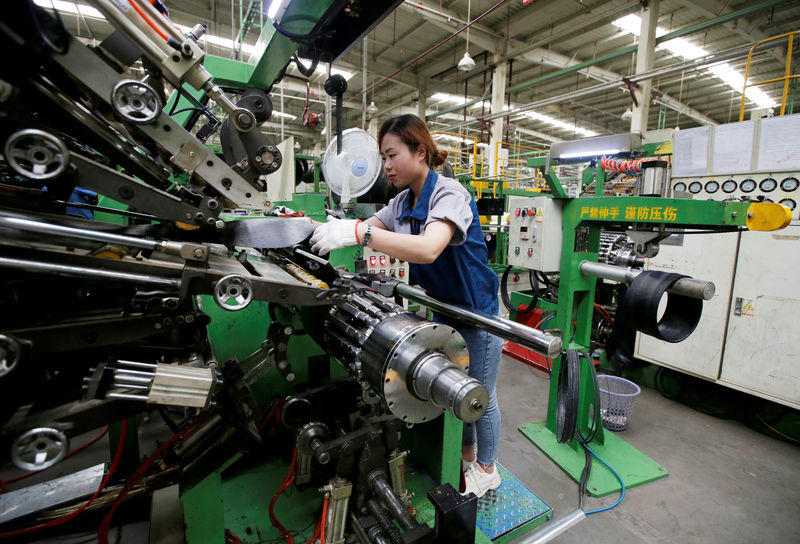By Jonathan Cable and Leika Kihara
LONDON/TOKYO (Reuters) - The bitter trade war between China and the United States kept global factory activity largely in decline in August, business surveys showed, strengthening the case for policymakers to unleash fresh stimulus to fend off recession risks.
In a fresh escalation of the trade spat, the United States began imposing 15% tariffs on a variety of Chinese goods on Sunday. China reciprocated with new duties on U.S. crude oil, increasing fears of a global economic slowdown.
An ongoing decline in the euro zone's export-reliant powerhouse of Germany meant factory activity in the bloc contracted for a seventh month in August, bolstering expectations the European Central Bank will ease monetary policy next week.
IHS Markit's August final manufacturing Purchasing Managers' Index (PMI) was 47.0, matching an earlier flash reading but well below the 50 level separating growth from contraction.
While an improvement on July, that month's reading was the euro zone's lowest since December 2012.
In one brighter spot, as it is less dependent on exports than other euro zone countries, France's economy has so far proved more impervious to a slowdown and factory activity returned to growth as manufacturers saw output and client demand pick up.
Manufacturing in Britain, rocked by the deepening Brexit crisis and global downturn, contracted last month at the fastest rate in seven years.
"The big picture is that manufacturing is on track to contract for a second consecutive quarter, and a meaningful recovery is unlikely given the ongoing struggles of global manufacturing," said Andrew Wishart, an economist at Capital Economics.
"And while the euro zone equivalent ticked up, it points to manufacturing output from the bloc continuing to contract."
A similar survey due later from the United States is expected to show slowing manufacturing growth in the world's largest economy. (reuters://realtime/verb=Open/url=cpurl://apps.cp./Apps/econ-polls?RIC=USPMI%3DECI poll data)
But in a surprise development, China's factory activity expanded as output edged up, a private sector PMI showed, although orders remained weak and business confidence faltered.
Following Monday's data, market sentiment remained fragile and while European stocks rose cautiously, driven by a rally in miners, the euro was 0.05% lower at $1.0985 (EUR=), not far from a two-year low of $1.0963 hit in U.S. trade on Friday.
ASIAN STRAIN
Export-reliant South Korea, Japan and Taiwan saw factory activity shrink, underscoring the growing pain from the tit-for-tat tariff war between the world's two-largest economies.
"The broader picture for Asian exports remains very weak because of the impact of the U.S.-China trade war, which is continuing to escalate," said Rajiv Biswas, Asia Pacific chief economist at IHS Markit.
In China, the Caixin/Markit Manufacturing PMI for August rose to a five-month high of 50.4 from 49.9 in July, beating a median market forecast.
The reading followed Beijing's official PMI that showed factory activity shrank in August for the fourth month in a row, pointing to a further slowdown in the world's second-largest economy.
India, an Asian economic powerhouse, saw the slowest expansion in its manufacturing sector in 15 months as demand and output grew at their weakest pace in a year.
Data on Friday showed India's economic growth hit a 6-year low in April-June, raising chances of the central bank cutting interest rates further at its next meeting.
Elsewhere, Japanese manufacturing activity fell for a fourth straight month, underlining a darkening outlook for the world's third-largest economy.
While Japan's exports slipped for an eighth month in July due to slumping China-bound sales, the economy has so far enjoyed steady growth thanks to robust domestic demand.
But there are signs the economy may start to lose the support from consumption and capital expenditure.
Manufacturers surveyed in the PMI data said the end of a construction spike ahead of the 2020 Tokyo Olympic Games and a scheduled sales tax hike in October are expected to hurt output volumes the coming months.
Any further sign of weakness in domestic demand could add pressure on the Bank of Japan to ramp up stimulus at its rate review on Sept. 18-19, which follows the ECB's latest policy decision and that of the U.S. Federal Reserve.
"The U.S.-China trade war is escalating and we're also seeing tensions heighten between Washington and Europe," which could cause the global economy to falter," said Yoshimasa Maruyama, chief market economist at SMBC Nikko Securities.
"Japan may slide into recession around the time the sales tax hike takes effect," he added.

South Korean's factory activity also shrank as manufacturers felt the pinch not just from the U.S.-China trade war but an escalating diplomatic dispute with Japan, strengthening the case for additional policy easing by the country's central bank, following a surprise interest rate cut in July.